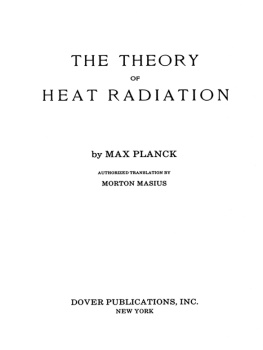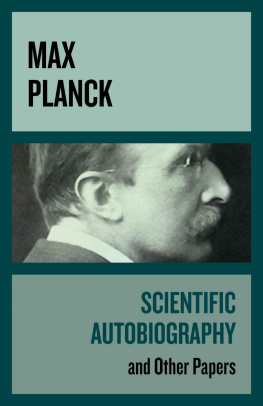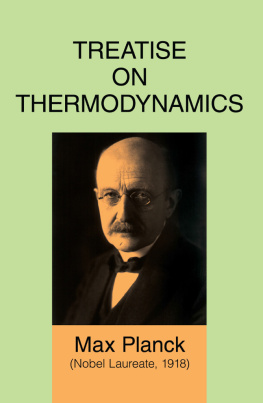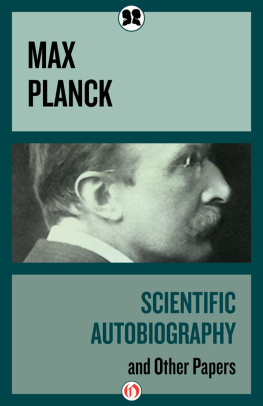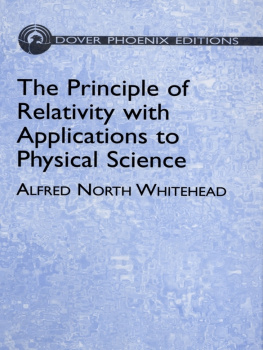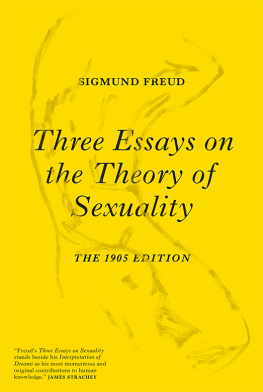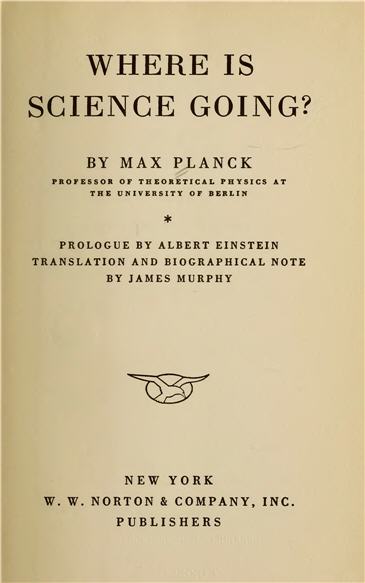WHERE IS SCIENCE GOING?
BY MAX PLANCK
PROFESSOR OF THEORETICAL PHYSICS AT THE UNIVERSITY OF BERLIN
PROLOGUE BY ALBERT EINSTEIN TRANSLATION AND BIOGRAPHICAL NOTE BY JAMES MURPHY

NEW YORK
W. W. NORTON & COMPANY, INC PUBLISHERS
WHERE IS SCIENCE GOING?
Books by Max Planck
WHERE IS SCIENCE GOING?
THE UNIVERSE IN THE LIGHT OF MODERN PHYSICS
Copyright, 1932
W. W. NORTON & COMPANY, INC.
70 Fifth Avenue, New York
PRINTED IN THE UNITED STATES OF AMERICA FOR THE PUBLISHERS BY THE VAN REES PRESS
CONTENTS
III. THE SCIENTISTS PICTURE
OF THE PHYSICAL UNIVERSE
IV. CAUSATION AND FREE WILL:
THE PROBLEM STATED
V. CAUSATION AND FREE WILL:
THE ANSWER OF SCIENCE
Discussion of atomic weights, concept of energy;
difference between reversible and irreversible processes
PLANCK-EINSTEIN-MURPHY
PROLOGUE
BY ALBERT EINSTEIN
M ANY kinds of men devote themselves to Science, and not all for the sake of Science herself. There are some who come into her temple because it offers them the opportunity to display their particular talents. To this class of men science is a kind of sport in the practice of which they exult, just as an athlete exults in the exercise of his muscular prowess. There is another class of men who come into the temple to make an offering of their brain pulp in the hope of securing a profitable return. These men are scientists only by the chance of some circumstance which offered itself when making a choice of career. If the attending circumstance had been different they might have become politicians or captains of business. Should an angel of God descend and drive from the Temple of Science all those who belong to the categories I have mentioned, I fear the temple would be nearly emptied. But a few worshipers would still remain some from former times and some from ours. To these latter belongs our Planck. And that is why we love him.
I am quite aware that this clearance would mean the driving away of many worthy people who have built [Page 7] [Page 8] a great portion, and even perhaps the greatest portion, of the Temple of Science. But at the same time it is clear that if the men who have devoted themselves to science consisted only of the two categories I have mentioned, the edifice could never have grown to its present proud dimensions, no more than a forest could grow if it consisted only of creepers.
But let us forget them. Non ragionam di lor. And let us fix our gaze on those who have found favor with the angel. For the most part they are strange, taciturn and lonely fellows. And, in spite of this mutual resemblance, they are far less like one another than those whom our hypothetical angel has expelled.
What has led them to devote their lives to the pursuit of science? That question is difficult to answer and could never be answered in a simple categorical way. Personally I am inclined to agree with Schopenhauer in thinking that one of the strongest motives that lead people to give their lives to art and science is the urge to flee from everyday life, with its drab and deadly dullness, and thus to unshackle the chains of ones own transient desires, which supplant one another in an interminable succession so long as the mind is fixed on the horizon of daily environment.
But to this negative motive a positive one must be added. Human nature always has tried to form for itself a simple and synoptic image of the surrounding world. In doing this it tries to construct a picture which will give some sort of tangible expression to what the human mind sees in nature. That is what the poet does, [Page 9] and the painter, and the speculative philosopher and the natural philosopher, each in his own way. Within this picture he places the center of gravity of his own soul, so that he will find in it that rest and equilibrium which he cannot find within the narrow circle of his restless personal reactions to everyday life.
Among the various pictures of the world which are formed by the artist and the philosopher and the poet, what place does the world-picture of the theoretical physicist occupy? Its chief quality must be a scrupulous correctness and internal logical coherence, which only the language of mathematics can express. On the other hand, the physicist has to be severe and self-denying in regard to the material he uses. He has to be content with reproducing the most simple processes that are open to our sensory experience, because the more complex processes cannot be represented by the human mind with the subtle exactness and logical sequence which are indispensable for the theoretical physicist.
Even at the expense of completeness, we have to secure purity, clarity and accurate correspondence between the representation and the thing represented. When one realizes how small a part of nature can thus be comprehended and expressed in an exact formulation, while all that is subtle and complex has to be excluded, it is only natural to ask, what sort of attraction this work can have? Does the result of such self-denying selection deserve the high-sounding name of World-Picture?
I think it does; because the most general laws on [Page 10] which the thought-structure of theoretical physics is built have to be taken into consideration in studying even the simplest events in nature. If they were fully known one ought to be able to deduce from them by means of purely abstract reasoning the theory of every process of nature, including that of life itself. I mean theoretically , because in practice such a process of deduction is entirely beyond the capacity of human reasoning. Therefore the fact that in science we have to be content with an incomplete picture of the physical universe is not due to the nature of the universe itself but rather to us.
Thus the supreme task of the physicist is the discovery of the most general elementary laws from which the world-picture can be deduced logically. But there is no logical way to the discovery of these elemental laws. There is only the way of intuition, which is helped by a feeling for the order lying behind the appearance and this Einfuehlung is developed by experience. Can one therefore say that any system of physics might be equally valid and possible? Theoretically there is nothing illogical in that idea. But the history of scientific development has shown that of all thinkable theoretical structures a single one has at each stage of advance proved superior to all the others.
It is obvious to every experienced researcher that the theoretical system of physics is dependent upon and controlled by the world of sense-perception, though there is no logical way whereby we can proceed from sensory perception to the principles that underlie the [Page 11] theoretical structure. Moreover, the conceptual synthesis which is a transcript of the empirical world may be reduced to a few fundamental laws on which the whole synthesis is logically built. In every important advance the physicist finds that the fundamental laws are simplified more and more as experimental research advances. He is astonished to notice how sublime order emerges from what appeared to be chaos. And this cannot be traced back to the workings of his own mind but is due to a quality that is inherent in the world of perception. Leibniz well expressed this quality by calling it a preestablished harmony.
Physicists sometimes reproach the philosophers who busy themselves with theories of knowledge, claiming that the latter do not appreciate this fact fully. And I think that this was at the basis of the controversy waged a few years ago between Ernst Mach and Max Planck. The latter probably felt that Mach did not fully appreciate the physicists longing for perception of this preestablished harmony. This longing has been the inexhaustible source of that patience and persistence with which we have seen Planck devoting himself to the most ordinary questions arising in connection with physical science, when he might have been tempted into other ways which led to more attractive results.


